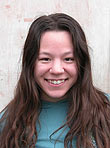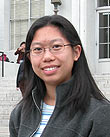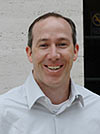Berkeleyan
Environmental justice, the hard way
Eschewing the lecture hall, Dara O'Rourke's students learn about equity - and humility - from the grassroots up
![]()
| 02 March 2005
Undergrads Vivian Choi and Kathleen Rubio spent part of the fall semester looking at disparities in Bay shoreline access for high- and low-income communities. Their classmates, Nina Rizzo and Charles Kirubi, helped open-space advocates in North Richmond explore locals' attitudes toward an endangered wetland, while freshman Talia Levitan led a team in puzzling out what to do when restoration efforts bump up against homeless streamside dwellers.
| "The first lesson we learned was to humble ourselves.... We learned very quickly that we weren't the experts." -Nina Rizzo
|
 |
Instead, he arranged for his students to work with a rainbow of nonprofits on such issues as mercury-mine leaching on Indian lands, seafood contamination in poor and minority communities, women farmworkers' views on pesticide handling and exposure, environmental health in affordable-housing projects in San Francisco's Chinatown, and the ecological impacts of prisons.
Instruction, not extraction
More recently, as an assistant professor with the College of Natural Resources, he helped arm citizens living near refineries in Louisiana and trash-transfer stations in Brooklyn with hard data about pollution in their communities, the better to hold violators accountable. O'Rourke, who says his options as a budding mechanical engineer were "basically build widgets or build bombs," shifted gears after graduation from MIT to environmental work, including a stint with the United Nations. Over the past few years, he's "been looking more and more into the globalization of production," and "how to change systems so we get the jobs we want, and the stuff we want, without all the adverse impacts - or at least less of the adverse impacts - producing what we need without destroying communities and the environment." Traditional academic research, he says, "is an extractive model - you go out into the community and take their information, and then you come back and write papers and books and give lectures, and you benefit from it.. One of the things that makes Berkeley such an attractive place to me, and one of the reasons I came here, is this idea of a public university that is really in service to the public, to the state, and to the world." Teaching here, he adds, is "the most privileged position in the world." "I want to use that privilege," says O'Rourke, "to try to solve problems that matter to people. This class is an opportunity to benefit the students, first, and also, hopefully, these local groups that are working on these kinds of problems." -B.B. |
The "active learning" philosophy O'Rourke brings to his American Cultures course is a natural outgrowth of his approach to research, which, in contrast to the "extractive model," aims to return some benefit to the community. (See sidebar at right.) The 130 students game enough to stick with it - a few dozen fled upon hearing the rules - split into three-to-five-member teams, each of which was assigned to provide research assistance to a local nonprofit. In all, 33 non-governmental organizations (NGOs) agreed to take part, from the Asian Pacific Environmental Network to Youth United for Community Action. Despite a number of challenges - especially the logistics of scheduling meetings, and the difficulty of finding staff time at some of the NGOs to supervise student volunteers - the groups' feedback was overwhelmingly positive.
For Nina Rizzo, a junior majoring in geography, the feeling was mutual. "Lectures, and theories, and articles in a reader can only go so far," she explains. "I really appreciate the fact that [O'Rourke] sort of threw us out there. Because just experiencing the interaction with the people who are actually trying to do grassroots organizing, and realizing how complicated everything is, was a really important experience to have."
Rizzo was part of a team assigned to the North Richmond Shoreline Open Space Alliance, a group whose mission is to preserve Breuner Marsh, a recreational resource for the predominantly African American residents of nearby Parchester Village. To home in on the community's attitudes toward the 200-acre wetland, and its awareness of looming development threats, the student team developed a questionnaire, conducted interviews with residents and civic leaders at a local festival, organized their data in spreadsheets, and eventually helped prepare a brochure on the issues facing the marsh.
 |
"Quite enriching...to see this constant tension of community interests fighting against developers." -Charles Kirubi
|
"The first lesson we learned," observes Rizzo, "was to humble ourselves, and let them tell us what they needed from us. We learned very quickly that we weren't the experts - that we might have some ideas, but when it came down to it, these people had been working on this for years, maybe."
In their project for the Bay Institute, which aims to protect the Bay-Delta watershed, Vivian Choi and Kathleen Rubio unearthed new insights by looking into the equity implications of access to San Francisco Bay, such as the quality of beaches available to disparate communities, the correspondence of resources and needs, and disabled access.
"Our focus was on proximity to an environmental good, instead of proximity to a landfill," explains Rubio, a sophomore interested in conservation and resource studies. The project, she says, "gave me some insight into how it all actually works, and how difficult environmental justice really is to define."
| "Most of the classes I take are cut-and-dried.... In the real world, there's not
necessarily a right answer."
-Vivian Choi
|
 |
Her own point of view, she adds, was changed by the class. She learned, for instance, that Indians who relied on the Bay for food weren't told "for the longest time" about dangerously high levels of mercury in fish, just one example of how environmental impacts fall more heavily on some populations than others.
"I don't think I thought about it that much before this class," she says," but it's really everywhere I look now."
Freshman Talia Levitan, who intends to major in Italian and legal studies, found environmental-justice issues cropping up even in environmentalists' efforts at stream beautification. Her project for Friends of Five Creeks, a group dedicated to restoring degraded creek areas in the East Bay, was to recommend protocols for dealing fairly with homeless people - an issue that arose when Five Creeks volunteers encountered a homeless encampment at the so-called Albany Bulb.
"Most people don't really think about the fact that restoration could possibly have a negative effect," says Levitan. "I never thought there could be a connection between water restoration and homelessness."
Her team was surprised by the intensity of opinion expressed in interviews they conducted. "When we would talk to homeless people or homeless-advocacy groups, usually they would be really adamant about telling us this is their space and creek restorationists shouldn't intrude, and that basically they don't trust the police to evacuate them and make sure they have someplace else to go," she says. "And we'd have the complete opposite response from restoration organizations, who would say it's not our responsibility, it's up to the police.. [and] the most important issue is the environment."
To O'Rourke, the displacement of homeless people locally carries echoes of the developing world, where illegal squatter settlements are often threatened by conservation efforts. "I think for a long time the environmental movement thought, all right, kick 'em out, close it off, put a fence around it," he explains. "Turns out it doesn't work. If you don't deal with economic-survival and self-sufficiency issues, they're back in there, and it may be worse than it was before. So long-term, if you want creek restoration in Berkeley and Albany, you really should be thinking about those issues also."


